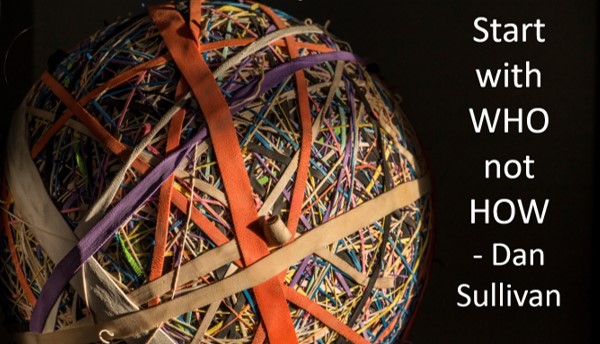After you set a goal, your first question should be “Who?” not “How?”

Tis the season for reflection of the year that’s been and anticipation of the year to come.
How will you define success for 2019?
That was the question posed to a group of over 100 lawyers at a course I launched with the Law Society of Ontario in December.
The responses were personal and varied:
- Attend yoga 2 times a week
- Give myself time to build my practice
- Spend more time with family and friends
- Improve my social media presence
- Become a mentor
- Build my client base
- Transition from student to practicing lawyer
What are the criteria you use to define success?
Our participants talked about their sign posts of success including:
- Impact in the world
- Balance in my personal and professional life
- Recognition from my peers
- Financial stability
- Freedom from stress
When you are looking forward and designing your future – the first thing that often happens is the panic over “how am I going to do that”?
Your vision of the future starts tangling up. It starts looking complicated. It starts piling up like a ball of rubber bands.
The question of “how do I do that?” can leave you feeling overwhelmed or uninspired or both.
What if when you are designing your future or setting a new goal or starting a new project you started with questions of “who” before “how”. That’s what Dan Sullivan, Co-Founder of Strategic Coach recommends in his new book Who Not How. I can tell you from personal experience – it works.
Your “Who” questions might be :
- Who does this work? Could they do it for me?
- Who can I ask for advice?
- Who can I tap to collaborate on this?
- Who on my team is best to do this?
- Who can start this? Who could finish this?
- Who can help me untangle what I want?
- Who can teach me?
When you “who” a problem as the introductory step you by-pass the overwhelm. It automatically starts breaking down the problem into smaller pieces. EVEN if you end up resolving the problem on your own and completing the tasks yourself – the action of asking “who” will force you to examine your problem with a level of objectivity you can never achieve from “how”.
In my coaching, I get people to list their Anchors and Kites. These are people who form their cabinet of advisors. Oprah Winfrey calls her people her “kitchen cabinet”.
In the Anchors and Kites model, Anchors are the people who hold us to our values and keep us focused on what is important. Kites inspire us to new heights. Kites are the people who provide us with new vantage points.
As you embark on your 2019 journey, think WHO before HOW. Consider WHO you will invite into your circle this year. Consider WHO can lighten your load. Think about WHO could expand your client base and your impact in the world. Consider WHO will be served.
Happy dreaming and goal setting!